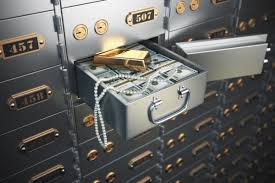Pan-African lender, Ecobank, has announced it will discontinue its safe deposit box services in Togo by August 1, 2025, marking a further retreat from a once-premium service that has become financially and operationally burdensome for banks across the world.
In an official notice sent to clients, Ecobank urged all safe deposit box holders to retrieve their valuables before the July 31 deadline. According to the bank, any items not collected by the cut-off date will be handed over to a designated third-party custodian.
Ecobank’s decision reflects a growing international trend, as financial institutions scale back or shut down safe deposit box services due to high operating costs, minimal revenue, and rising regulatory scrutiny. In Togo and across the broader West African region, the trend signals a strategic shift by banks focusing more on digital financial services and less on physical, low-margin offerings.
Safe deposit boxes, once considered essential for affluent clients to store important documents, jewellery, and other valuables, are fast becoming obsolete. The service demands heavy spending on security infrastructure, 24-hour surveillance, temperature-controlled environments, and dedicated staff. In return, banks earn relatively little, making it increasingly difficult to justify in today’s cost-conscious banking environment.
Also contributing to the phase-out are complex legal and compliance challenges. Many banks are concerned about liability risks in cases of theft, loss or damage, and about potential misuse of boxes for illicit purposes such as money laundering or terrorist financing. Global regulatory bodies have heightened scrutiny, increasing compliance burdens on banks that continue to offer the service.
The trend is not unique to Ecobank or Togo. Across the globe, several major banks have already taken similar steps. JPMorgan Chase, HSBC, Barclays, and Capital One have scaled down or completely stopped offering the service in certain markets. In Switzerland—long considered the gold standard for safe deposit storage—banks are gradually transitioning clients to specialised third-party providers like Swiss Gold Safe. Despite an estimated 350,000 active safe deposit boxes still in use in the country, the banking sector is slowly moving away from the business.
Elsewhere in Central Europe, banks are also closing down their secure storage facilities, citing cost and risk. In the United States, a Wall Street Journal report noted that about 20 percent of banks have phased out safe deposit boxes in the last six years. In South Africa, Absa stopped offering the service in September 2024, following FNB’s earlier decision to exit the space in 2017 after multiple security-related incidents.
The shift away from bank-based storage has led to the rise of independent private vault services, which are stepping in to meet the storage needs of former bank customers. These private storage firms now offer premium features such as biometric access, 24-hour remote monitoring, and bespoke insurance coverage, positioning themselves as modern, secure alternatives.
In response to this shift, customers are also increasingly turning to digital alternatives. The use of encrypted digital vaults for storing important documents has grown rapidly. Additionally, there has been a notable increase in the sales of home safes, as consumers seek more control over the security of their valuables. In Morocco, for instance, home safe purchases surged following the COVID-19 pandemic, driven by growing distrust in institutional storage and a preference for in-house protection.
Ecobank’s decision to discontinue the service further illustrates the evolving priorities of Africa’s banking sector. The move is consistent with the bank’s broader strategy of focusing on digital innovation, financial inclusion, and scalable services across its footprint in over 30 African countries.
As more banks pivot away from legacy services, customers will need to explore alternative storage options—either via trusted private vault services or home-based safes. What is clear is that the traditional safe deposit box, once a symbol of financial security and exclusivity, is fast losing its place in modern banking.
